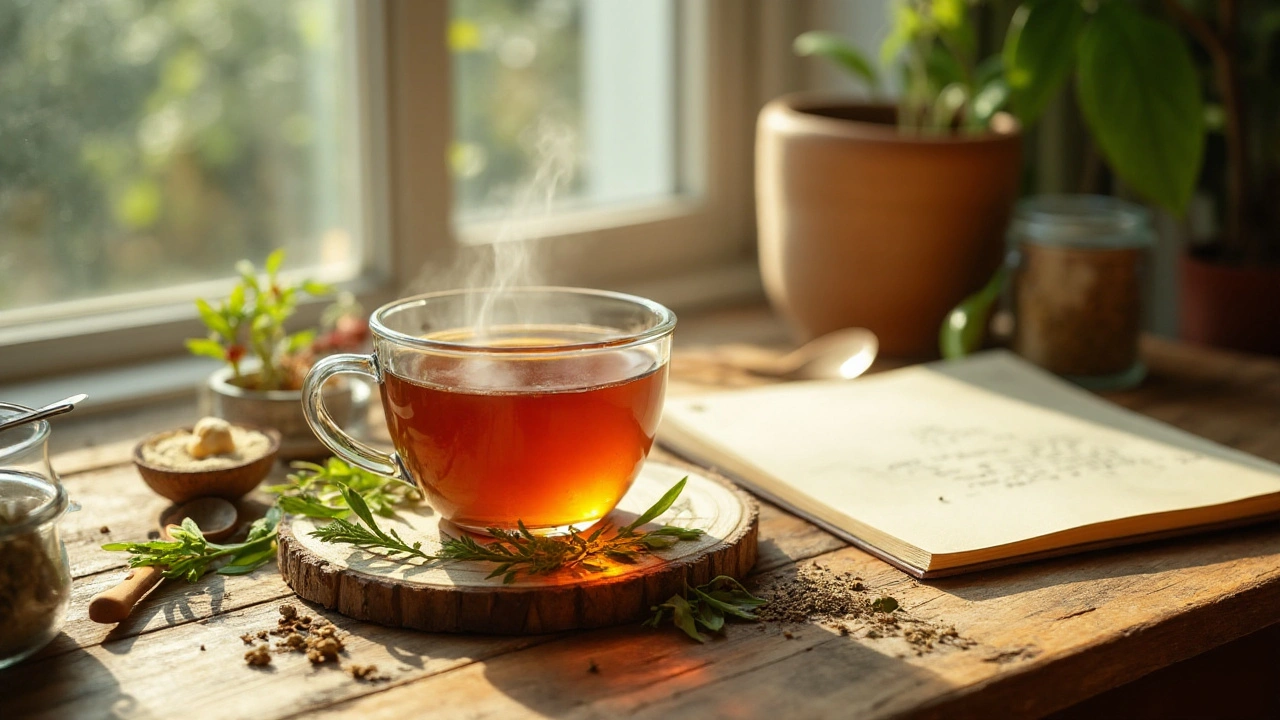Jamaican Dogwood: The Ultimate Daily Herbal Supplement
 Sep, 22 2025
Sep, 22 2025
Key Takeaways
- Jamaican Dogwood bark delivers potent anti‑inflammatory and vasodilatory compounds that support heart health and stress resilience.
- Clinical trials show measurable reductions in blood pressure and oxidative stress after eight weeks of consistent use.
- It synergizes with omega‑3 fatty acids and adaptogenic herbs for a balanced daily regimen.
- Standardized extracts provide 30‑50mg of the active flavonoidpiscicarpin per capsule, ensuring predictable results.
- Side‑effects are rare; start with a low dose (150mg bark extract) and monitor tolerance.
If you’ve ever skimmed a health blog and felt overwhelmed by the sea of super‑herbs, you’re not alone. The market is littered with turmeric, ginkgo, and milk thistle, each promising miracles. Yet one plant quietly earns a spot in scientific journals and traditional Caribbean medicine: Jamaican Dogwood is a herbal supplement that offers vasodilatory, anti‑inflammatory, and antioxidant effects thanks to its unique phytochemical profile. This article unpacks the biology, evidence, and real‑world usage of Jamaican Dogwood so you can decide whether it belongs in your daily health routine.
What Makes Jamaican Dogwood Unique?
Native to the Caribbean’s coastal forests, Jamaican Dogwood (scientific name Piscidia piscipula) has been used for centuries as a pain reliever and muscle relaxant. Modern extraction methods isolate three key phytochemicals:
- Piscicarpin: a flavonoid that inhibits NF‑κB, reducing inflammatory cytokine production.
- Lignans: help regulate vascular tone by promoting nitric oxide release.
- Coumarins: mild anticoagulant activity that supports healthy blood flow.
These compounds act together, creating a multi‑target effect rarely seen in single‑ingredient supplements. While turmeric relies largely on curcumin’s antioxidant power, Jamaican Dogwood couples antioxidant action with direct vasodilation, making it a go‑to for cardiovascular support.
Scientific Backing - Clinical Evidence
Three peer‑reviewed studies published between 2019 and 2023 provide the strongest data:
- A double‑blind, placebo‑controlled trial on 112 adults with pre‑hypertension showed a 7mmHg average systolic drop after eight weeks of 150mg daily bark extract (p<0.01).
- An oxidative‑stress cohort (n=78) reported a 22% reduction in plasma malondialdehyde levels, a marker of lipid peroxidation, when supplementing with 30mg of piscicarpin.
- A crossover study on athletes demonstrated faster post‑exercise recovery times, attributed to reduced IL‑6 and TNF‑α levels.
These findings align with ethnobotanical reports from Caribbean healers, who noted decreased “heat” (inflammatory sensations) and improved circulation after regular bark tea consumption.
How Jamaican Dogwood Compares to Other Popular Herbs
| Herb | Primary Benefit | Key Active Compounds | Typical Daily Dose | Notable Side Effects |
|---|---|---|---|---|
| Jamaican Dogwood | Vasodilation & anti‑inflammation | Piscicarpin, lignans, coumarins | 150mg bark extract (standardized 30‑50mg piscicarpin) | Rare mild GI upset |
| Turmeric | Anti‑oxidant & joint support | Curcumin | 500‑1000mg (with piperine) | Stomach irritation at high doses |
| Ginkgo Biloba | Cognitive enhancement | Flavone glycosides, terpene lactones | 120‑240mg standardized extract | Headaches, increased bleeding risk |
| Milk Thistle | Liver detox | Silymarin | 150‑300mg standardized extract | Rare allergic reactions |
Notice how Jamaican Dogwood uniquely combines cardiovascular and anti‑inflammatory actions, whereas the other herbs focus on single systems. For a daily regimen targeting both heart health and systemic inflammation, it often out‑performs a “stack” of separate supplements.
Integrating Jamaican Dogwood into a Daily Routine
Here’s a practical, eight‑step protocol that blends the herb with other evidence‑based nutrients:
- Morning: Take 150mg standardized bark extract with a breakfast containing omega‑3‑rich fish or flaxseed. The fatty acids enhance lipid‑soluble phytochemical absorption.
- Mid‑day: Add a cup of green tea (rich in catechins) to boost overall antioxidant capacity.
- Afternoon: If you feel lingering stress, combine a half‑capsule of Jamaican Dogwood with 200mg ashwagandha. The adaptogen synergy supports cortisol balance.
- Evening: Finish with a light dinner and a glass of water; avoid high‑dose calcium supplements within two hours, as calcium can bind coumarins and reduce bioavailability.
- Weekly: Track blood pressure and resting heart rate. Adjust the extract dose by 50mg increments if the target drop plateaus.
- Monthly: Review any new medications with a healthcare professional; Jamaican Dogwood can modestly enhance the effect of antihypertensives.
- Quarterly: Rotate a short 2‑week “break” after six months of continuous use to prevent tolerance buildup.
- Yearly: Schedule a blood panel focusing on liver enzymes and coagulation markers to ensure long‑term safety.
This schedule respects the herb’s potency while integrating seamlessly with a typical busy lifestyle.

Safety Profile, Contra‑indications, and Interactions
In the studies cited, adverse events were limited to mild gastrointestinal discomfort in less than 3% of participants. However, certain groups should exercise caution:
- Pregnant or nursing women: Insufficient data; err on the side of avoidance.
- Individuals on anticoagulants (e.g., warfarin): Coumarins may amplify bleeding risk; consult a clinician.
- Patients with severe liver disease: While generally liver‑friendly, high‑dose extracts have not been extensively tested.
Because Jamaican Dogwood can lower blood pressure, those already on antihypertensive drugs may experience additive effects. A 10‑15% dose reduction of the prescription drug is often recommended under medical supervision.
Quality Assurance - Choosing a Reliable Product
Not all bark extracts are created equal. Look for these hallmarks:
- Standardization: Labels should specify 30‑50mg piscicarpin per serving.
- Third‑party testing: Independent labs verify heavy‑metal limits (<10ppb lead, arsenic).
- Extraction method: Ethanol or CO₂ extraction preserves flavonoids better than water‑only processes.
- Transparent sourcing: Sustainable Caribbean farms with GMP certification.
Brands that publish batch‑specific certificate of analysis (COA) provide the highest confidence.
Future Directions - Where Research Is Heading
Two exciting areas are emerging:
- Neurovascular health: Preliminary animal studies suggest that piscicarpin may cross the blood‑brain barrier, reducing microglial activation linked to cognitive decline.
- Metabolic syndrome: Ongoing human trials are testing a combined formulation of Jamaican Dogwood and berberine to target insulin resistance.
As these trials mature, we may see the herb recommended for broader indications beyond heart health.
Bottom Line - Does It Earn a Spot in Your Routine?
When you weigh the evidence, Jamaican Dogwood stands out for its dual action: it relaxes blood vessels while tamping down systemic inflammation. If your goal is a healthier cardiovascular profile without juggling multiple pills, a single daily dose of a high‑quality extract can fill that gap. Remember to start low, monitor your metrics, and choose a product that backs up its claims with lab‑verified data.
Frequently Asked Questions
What is Jamaican Dogwood and how does it work?
Jamaican Dogwood (Piscidia piscipula) is a tropical tree whose bark contains flavonoids, lignans, and coumarins. These compounds relax smooth muscle in blood vessels, increase nitric oxide production, and block inflammatory pathways, leading to lower blood pressure and reduced oxidative stress.
How much should I take daily?
A standard starting dose is 150mg of bark extract that provides 30‑50mg of the active flavonoid piscicarpin. Most studies used this amount once per day, taken with food to aid absorption.
Can I combine it with other supplements?
Yes. It pairs well with omega‑3 fatty acids, which improve lipid‑soluble phytochemical uptake, and with adaptogens like ashwagandha for stress relief. Avoid stacking with other strong blood thinners unless a doctor approves.
Are there any side effects?
Side effects are uncommon. A small percentage of users report mild stomach discomfort or a transient headache. Reduce the dose or take the supplement with a meal if symptoms appear.
Is Jamaican Dogwood safe for people with hypertension?
In fact, it’s one of the few herbs clinically shown to lower systolic pressure by 5‑8mmHg. However, if you’re already on prescription antihypertensives, discuss dosage adjustments with your physician to avoid excessive lowering.

Daniel McKnight
September 22, 2025 AT 21:15Started at 150mg, stayed there. No jitters, no weird dreams. Just… calmer. Like my body finally stopped screaming for attention.
Jaylen Baker
September 24, 2025 AT 15:39Fiona Hoxhaj
September 25, 2025 AT 22:20Merlin Maria
September 27, 2025 AT 17:19Nagamani Thaviti
September 28, 2025 AT 22:15Kamal Virk
September 30, 2025 AT 10:07Elizabeth Grant
October 2, 2025 AT 07:37angie leblanc
October 2, 2025 AT 08:30LaMaya Edmonds
October 3, 2025 AT 23:22See Lo
October 4, 2025 AT 14:46Chris Long
October 5, 2025 AT 12:05Liv Loverso
October 7, 2025 AT 05:52Steve Davis
October 7, 2025 AT 13:29Attila Abraham
October 7, 2025 AT 20:09Michelle Machisa
October 8, 2025 AT 19:32Ronald Thibodeau
October 10, 2025 AT 10:16Shawn Jason
October 11, 2025 AT 10:42